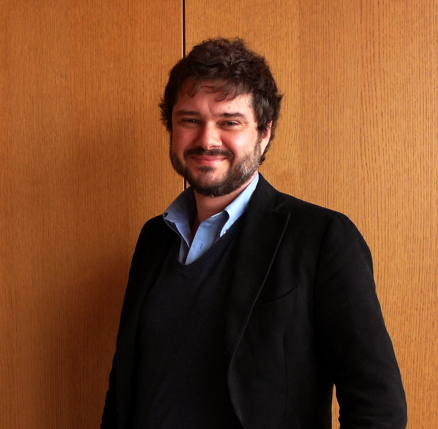“My mother thought she had a big nose and big feet, was too skinny with skimpy breasts. She would look in the mirror and say, ‘I don’t understand why people think I’m beautiful,’” Audrey Hepburn’s son said about his late mother, deemed the 20th century’s most beautiful woman by fans around the world.
Luca Dotti, 44, the second son of Hepburn, who stewarded Hollywood’s golden age, came to Korea last week to promote a fund-raising exhibition, “Beauty beyond Beauty,” held at Seoul’s Dongdaemun Design Plaza from Nov. 29 for 100 days.
Dotti is the president of Audrey Hepburn Children’s Fund, an organization dedicated to funding humanitarian groups to help impoverished and disadvantaged children worldwide.
The exhibition is showcasing photographs, posters, videos, clothes and other personal memorabilia that had never before been shown to the public. Hepburn’s 1953 Oscar for “Roman Holiday,” a Vespa scooter used in the filming and an 8-mm video of her family life, as well as paintings and cooking recipe books produced by Hepburn are included.
“Beauty beyond Beauty” was organized by the Audrey Hepburn Children’s Fund and Key Lime Media company, and is being directed by exhibition manager Choi Yo-han. $1 from each ticket sale will go to the fund.

Luca Dotti, the second son of Audrey Hepburn, poses after an interview with The Korea Herald. (Joel Lee/The Korea Herald)
“My career had been a complete mystery to me, a total surprise since the first day. I never thought I was going to be an actress. I never thought it would all happen the way it did,” Hepburn used to tell her son, Dotti said in a private interview with The Korea Herald at Shilla Hotel in Seoul last Friday.
Dotti added that his mother, idolized for her beauty, grace and style, lived a plain-vanilla life. “She didn’t live her life behind the glass. She was part of the city ― walking the streets of Rome, chumming with people,” Dotti said.
When his family lived in Switzerland and Italy during his childhood, Dotti’s friends were told by their parents exactly whom they were going to meet: “For kids, meeting someone special translates into wild expectations. So they thought my mother was some kind of a superhero like a batman or a witch,” Dotti said.
But after meeting Hepburn, his friends told him, “Hey! Your mother is very normal. She’s nice. Sweet.”
As a UNICEF Goodwill Ambassador, Hepburn devoted the last five years of her life to helping famished children in Africa, Asia, and Central and South America. Having gone through the afflictions of World War II in Nazi-occupied Holland, during which time she nearly starved to death, Hepburn remained devoted to her task until her death in late January 1993.
“My mother took her UNICEF job not as an actress, but as a mother,” Dotti said. “Wearing a bulletproof helmet and vest, she went to some of the most dangerous war-torn countries on over 50 UNICEF missions, waking up at 5 a.m. every morning to prepare her speeches, study medical reports and political situations.”
For her tireless contributions, which led to the U.S. government’s budget for UNICEF being increased fivefold, Hepburn was awarded the Presidential Medal of Freedom by then-President George H.W. Bush in December 1992.
Hepburn believed the world needed the “humanization of politics” rather than the “politicization of humanitarian aid”; she was famous for saying, “Nothing is impossible. The word itself says, ‘I’m possible.’”
In addition to acting in 27 movies, including “Sabrina,” “My Fair Lady” and “Breakfast at Tiffany’s,” Hepburn still holds the world record for appearing on the highest number of magazine covers at 650.
Hepburn was also happy to grow older, because it meant entering a “new season” of her life with more time for herself and family. Dotti said that the only qualms he has about the 23 years he spent with his mother are that she could not see his three children.
Dotti said that helping others is more than a moral responsibility. “It has direct consequences on our lives,” he said. “We live on one global planet. If we allow a part of our world to remain poor and sick, their misfortunes can spread.”
“Part of the reason why Africa’s poverty is so severe is because women have so many babies. They do it because the life expectancy is so low and many die prematurely. Even the ones that survive will live with resentment and anger,” he added.
Dotti referred to the Ebola crisis, which has plagued the world beyond West Africa.
“Europe faces the problem of African refugees from troubled regions and more than 10,000 people die every year in crossing the Mediterranean Sea, with their shabby ships sinking.
“People will not migrate so much in search of a better life if we stabilize the troubled regions,” he emphasized.
“My mother loved nature for this reason,” Dotti said. “Our world is like our garden. We need to protect, plow and feed our land for the next generation of spring. We cannot just grab the fruits.”
By Joel Lee (joel@heraldcorp.com)






![[Graphic News] More Koreans say they plan long-distance trips this year](http://res.heraldm.com/phpwas/restmb_idxmake.php?idx=645&simg=/content/image/2024/04/17/20240417050828_0.gif&u=)